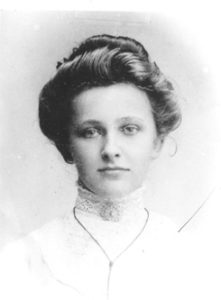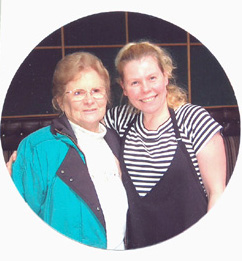 ~ An Everett Childhood
~ An Everett Childhood
By Phyllis Royce
“Housework is so much easier here. “ Clazina DeRooy wrote in a letter to her family in Holland. “Almost everyone has electricity.”
It was 1926 when Clazina, her husband and their six children first arrived in Everett. Although the new house did indeed have electric lights, it lacked the other labor-saving electrical appliances she had heard so much about.
According to her daughter, Grace, her mother’s first electrical appliance was an iron. Wrinkle free ‘wash and wear’ fabrics did not yet exist. Clazina, like other respectable homemakers, had, until that time, pressed almost every article of her family’s clean clothes with a heavy flat iron that had to be continually reheated on her wood stove. Her new appliance was light enough for a child to use, and it heated itself with the flick of a switch.
It was an even greater triumph, when, a few months after she acquired the electric iron, Clazina was able to write to her family in Holland that she now had: “a maid who never talks and who, when she works, murmurs softly. She washes everything completely clean, and if I just flip a little thing she wrings everything out. This servant is an electric washing machine. Oh Mother, that thing is such a delight. ‘Til now I’ve had to stand the whole day rubbing on my washboard. Now I can finish up completely—the washing, the bluing, and everything, in two hours or less.”
 Although Clazina did have an electric washer and an iron, she continued, much as her foremothers had done for generations, to clean house with mop, broom and dust rags, to sew clothing, not with a sewing machine but with needle and thread, to cook on a wood stove, and to try to protect food from spoiling in a “cool” corner chest or—later—in an icebox. It was 1947 before she finally acquired a real refrigerator.
Although Clazina did have an electric washer and an iron, she continued, much as her foremothers had done for generations, to clean house with mop, broom and dust rags, to sew clothing, not with a sewing machine but with needle and thread, to cook on a wood stove, and to try to protect food from spoiling in a “cool” corner chest or—later—in an icebox. It was 1947 before she finally acquired a real refrigerator.
The following are vignettes of growing up in Everett as a member of a Dutch immigrant family during the 1930s and 1940s:
My nine brothers and sisters and I all had our jobs. As we grew, we progressed to various duties. We enjoyed and begged to do them when we were little, but when the work became a regular assignment, the novelty quickly wore off. Our ‘entry-level’ assignment –about age five—was to dry the silverware. For twelve of us, this wasn’t a small job. From drying silverware we progressed to setting the table, peeling the potatoes, drying the dishes, and apparently a more responsible job, washing them. Serious ironing commenced with ‘doing the hankies’ (small square clothes used for blowing one’s nose before Kleenex was invented). One child would iron the dozens of hankies and carefully place them on a stack to one side; another stood by to fold and sort. Checking stockings for holes and rolling them into pairs was another job. For a family of twelve there would be several dozen pairs a week.
By the time we were seven or eight, we were helping with the annual spring cleaning and with the canning, taking peas out of pods, looking for worms, taking strings off the beans, shucking the corn, peeling and coring apples, etc. And always, Mom was around and on top of what we were doing….
Spring housecleaning began the day school was out. It meant completely emptying every room, stripping it of bedding, curtains, pictures….even the clothes from the closets. We washed what could be washed, including walls and woodwork and ceiling. We painted and varnished and wallpapered, as necessary and affordable. We never had a vacuum cleaner, so we took the living room rug— $3.00 at the Salvation Army—out to the yard and hit it with sticks. We cleaned the ceilings, beat the mattresses and the pillows and sometimes changed the ticking, washed blankets, furniture and bedsprings (which at the time were bare metal) —and then replaced everything where it belonged.
The work went on for two or three weeks, usually one room a day. Everyone was assigned chores. The boys moved the furniture and mattresses, carried ladders, took the beds outside, things like that; the girls washed and polished and remade the beds. I always thought that the boys had it a little easier than the girls, though the boys carried wood. We burned a lot of wood. Spring cleaning was usually completed—sometimes interrupted for a day or two when fruits ripened early—just in time for the jam and jelly making and summer canning.
When I was twelve in 1938 (the older girls were now in junior and senior high school), I inherited the responsibility of hurrying home at lunch time on Mondays to help hang out the laundry. Before the boys left for school, they would have helped carry the double boilers of hot water from the stove to the back porch and poured it into the washing machine and the large round tubs used for rinsing and bluing (bluing is a mild blue dye which counteracts the cream/gray color in white cloth).
Mom began the laundry early, and two large baskets were usually ready and waiting. After a very quick lunch of either cocoa and dried bread crusts or fried potatoes and rhubarb sauce or applesauce, I was in the yard, wiping the fine gray residue from the mills off the clotheslines with a damp cloth.
Mom would not permit haphazard hanging of the laundry. We hung the sheets together on the outside lines on either side of the yard. Towels, shirts and dresses hung on inside lines, and underclothing was hung on the very middle, far away from prying eyes. I figured our neighbors had more to look at than our clothesline, but it was important to Mom that our laundry look as neat as possible to the neighbors. She was always careful about appearances. With all this work, our house should have been spic and span. It wasn’t. But if it wasn’t neat, it was clean. With twelve people in the house, Mom did a remarkable job, especially without many electrical appliances. Of course she was home all day and had ten lackeys to do her bidding. But she must be given a good deal of credit for supervising ten apprentices and keeping us as organized as she did.
Religion was another important aspect of the DeRooy family’s life. Grace’s parents, Arie and Clazina, joined the Christian Reform Church immediately after they arrived in Everett. The entire family attended both morning and afternoon services on Sundays, Arie read to them from the Bible after supper, and the children attended Saturday catechism.
We were taught by example that life’s most important institution after family, is the church. We might misunderstand; understanding it, we might become angry with it, but we didn’t take it lightly. The entire family was active in the church.
We often congregated in the living room on Sunday to sing hymns as Tina (one of Grace’s sisters) played the piano. We also sang popular songs, but had to be selective to avoid Mom’s coming in and quietly but decisively picking up the piece and placing it aside or closing the piano. She liked to sing and often joined us, but to her, some songs were appropriate for Sunday, some were not.
Women were not permitted to vote in church matters, but were active in the Ladies Aid and undoubtedly advised their husbands in church matters they did know about. Church matters were often discussed at home, but kindly. We did not “serve up” the minister for Sunday dinner.
Movies were strictly forbidden, except for those offered free by local merchants just before the beginning of the school year. The ‘back to school’ movie was usually a cowboy movie and a cartoon—not something guaranteed to lead us down the path to sin. Ice cream was forbidden on Sunday, “verboten op Sundog”, and we were not allowed to play cards. I don’t think we had a lot of time to play games except during long summer evenings when we played out in the street with the neighbor kids.
At the end of our block stood a Roman Catholic Church, “Our Lady of Perpetual Help”, and the Catholic school. We played with our Catholic neighbors, but at times we would bicker, throw mud at each other and call each other names—never, of course, in our parent’s hearing. It had nothing to do with the difference in religion—it was just that we were different. We were Dutch; the Soriano family across the street, with almost as many children as ours, was Italian. They were recent immigrants, too…vocal and demonstrative…. Had it not been for the law, there would have been serious altercations at times. A final thrust at the end of a disagreement, always first checking carefully to see whether Dad or Mom was within hearing was our catcall: “If you ain’t Dutch, you ain’t much.”

© 2007 Sources: Grace DeRooy Spillman VerHoeven interviews with Phyllis Royce. DeRooy family journal and letters. Ten Little Dutchmen, Second Edition, Everett Washington, GVD Publications, 1998. Abstracted and edited from Phyllis Royce’s manuscripts and notes by Ann Duecy Norman
All Rights Reserved; WLP Story # 42
